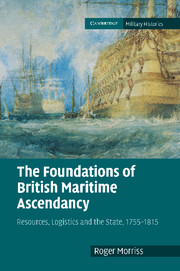Book contents
- Frontmatter
- Contents
- List of tables
- Preface
- Glossary of British weights, measures, casks and money values
- List of abbreviations
- Introduction
- 1 The British state in evolution
- 2 Defence and expansion
- 3 Economy and finance
- 4 Naval growth and infrastructure
- 5 Ordnance and technology
- 6 Manpower and motivation
- 7 Foodstuffs and victualling
- 8 Shipping and transportation
- 9 The supply of land forces overseas
- Conclusion
- Bibliography
- Index
7 - Foodstuffs and victualling
Published online by Cambridge University Press: 10 January 2011
- Frontmatter
- Contents
- List of tables
- Preface
- Glossary of British weights, measures, casks and money values
- List of abbreviations
- Introduction
- 1 The British state in evolution
- 2 Defence and expansion
- 3 Economy and finance
- 4 Naval growth and infrastructure
- 5 Ordnance and technology
- 6 Manpower and motivation
- 7 Foodstuffs and victualling
- 8 Shipping and transportation
- 9 The supply of land forces overseas
- Conclusion
- Bibliography
- Index
Summary
However they were recruited, the state's relationship with the members of its armed forces depended on its ability to feed them. The supply of food was fundamental. Its supply was also a logistical challenge which reflected well on the capabilities of the responsible bureaucracy. Most of the state's food originally came from within Britain. However, as domestic population grew, resources within England became inadequate and in the mid eighteenth century imports from Ireland, and later from the continent, became necessary. The Treasury organised the supply of provisions to the army while the Victualling Board supplied those to the navy, but in 1793 the latter also became responsible for supplying the army overseas. Foodstuffs were purchased centrally by contract or on commission, locally by agents at the yards, or by officials of the forces overseas. All stocks, however, were monitored meticulously in London, from where orders for new deliveries were made. At the point of distribution, food became the responsibility of the naval purser or army Commissariat. The role of the latter is examined later. That of the purser is examined here as a vital point of contact between the state and its employees.
The sources of foodstuffs
The agricultural revolution in England facilitated not just population, industrial and urban growth but the supply of Britain's armed forces in their operations overseas.
- Type
- Chapter
- Information
- The Foundations of British Maritime AscendancyResources, Logistics and the State, 1755–1815, pp. 271 - 320Publisher: Cambridge University PressPrint publication year: 2010



